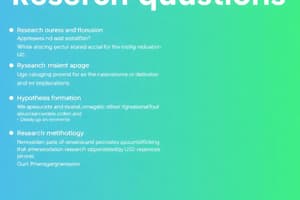Podcast
Questions and Answers
What distinguishes an aim from a construct in research?
What distinguishes an aim from a construct in research?
An aim outlines the goals of a study, while a construct represents mental interpretations of phenomena related to those goals.
Explain the role of a hypothesis in a research study.
Explain the role of a hypothesis in a research study.
A hypothesis serves as an assumption about the expected outcomes of the research questions being investigated.
What are variables in the context of research constructs?
What are variables in the context of research constructs?
Variables are measurable representations of constructs that can be manipulated or observed in the research.
How does operationalization relate to constructs and variables?
How does operationalization relate to constructs and variables?
What is the significance of clearly defined research questions?
What is the significance of clearly defined research questions?
Flashcards are hidden until you start studying
Study Notes
Aims
- Broad statements outlining research goals.
- Describe what researchers aim to achieve or explore within a study.
Constructs
- Mental representations of the phenomena being investigated.
- Represent the abstract concepts researchers want to understand.
Aim vs Construct
- Aims are broad goals, while constructs are the abstract concepts being investigated.
Research Questions
- Specific inquiries that reflect researchers' interests.
- Direct the research process by specifying what is being investigated.
Hypothesis/Claim
- Assumptions or predictions about the outcome of a study.
- Based on existing research or theory, and are tested through data analysis.
Aim vs Research Question vs Hypothesis
- Aim: Broad goal (e.g., understanding consumer behavior).
- Research Question: Specific inquiry (e.g., How does price affect consumer purchase decisions?).
- Hypothesis: A prediction (e.g., Higher prices will lead to lower purchase decisions).
Variables
- Tangible representations of constructs that can be measured.
- Represent the aspects of reality researchers can observe and analyze.
Aim vs Construct vs Potential Variables
- Aim: To understand the impact of stress on academic performance.
- Construct: Stress, academic performance.
- Potential Variables: Perceived stress levels (measured with a questionnaire), GPA, exam scores.
Types of Variables
- Independent variables: The variables manipulated or changed by the researcher to observe their impact.
- Dependent variables: The variables measured or observed as a result of the independent variables.
Problems with Variables
- Operationalization: The process of converting abstract constructs into measurable variables can be challenging and may not fully capture the intended concept.
- Measurement error: The tools and methods used to measure variables can introduce inaccuracies, affecting the results.
- Confounding variables: Other variables that may influence the relationship between the independent and dependent variables but are unaccounted for.
Studying That Suits You
Use AI to generate personalized quizzes and flashcards to suit your learning preferences.




